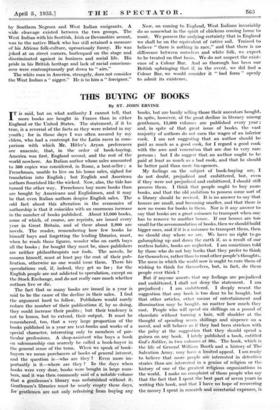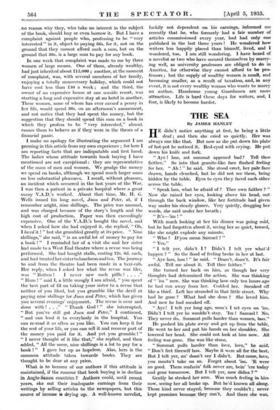THLS BUYING OF BOOKS
By ST. JOHN ERVINE IT is said, but on what authority I cannot tell, that more books are bought in France than in either England or the United States. The statement, if it be true, is a reversal of the facts as they were related in my youth ; for in those days I was often assured by my elders, who had a contempt for the Latin races in com- parison with which Mr. Hitler's Aryan preferences are anaemic, that, in the order of book-buying, America was first, England second, and the rest of the world nowhere. An Italian author whose sales amounted to 500 copies was considered, in Rome, a best-seller ; a Frenchman, unable to live on his home sales, sighed for translation into English ; but English and American authors flourished like the wicked. Now, alas, the tide has turned the other way. Frenchmen buy more books than are bought by Americans and Englishmen, and it may be that even Italian authors despise English sales. The odd fact about this alteration in the economics of authorship is that it coincides with an enormous increase in the number of books published. About 15,000 books, some of which, of course, are reprints, are issued every year in Great Britain, and of these about 2,000 are novels. The reader, remembering how few books he himself buys and forgetting the lending libraries, must, when he reads those figures, wonder who on earth buys all the books ; for bought they must be, since publishers are neither philanthropists nor fools. The novels, he assures himself, must at least pay the cost of their pub- lication, otherwise no one would issue them. There his speculations end, if, indeed, they get so far ; for the English people are not addicted to speculation, except on the Stock Exchange, and do not really care much whether authors live or die.
The fact that so many books are issued in a year is said to be the cause of the decline in their sales. I find the argument hard to follow. Publishers would surely reduce the number of their publications if, by so doing, they could increase their profits ; but their tendency is not to lessen, but to extend, their output. It must be remembered, too, that a very large proportion of the books published in a year are text-books and works of a special character, interesting only to members of par- ticulai professions. A shop-assistant who buys a book on salesmanship can scarcely be called a book-buyer in the general sense of the term. When we speak of book. buyers we mean purchasers of books of general interest, and the question is—who are they ? Even more im- portantly is it—where are they ? In the days when books were very dear, books were bought in large num- bers, and it was then commonly said of a notable volume that a gentleman's library was unfurnished without it. Gentlemen's libraries must• be nearly empty these days, for gentlemen are not only refraining from buying any books, but are busily selling those their ancestors bought: In ,spite, however, of the great decline in literacy among gentlemen, 15,000 volumes are published every year ; and, in spite of that great issue of books, the vast majority of authors do not earn the wages of an inferior cook. I am not suggesting that an author should be paid as much as a good cook, for I regard a good cook' with the awe and veneration that are due to very rare persons ; but I do suggest that, an author ought to be paid at least as much as a bad cook, and that he should be better paid than mere tin-openers.
My feelings on the subject of book-buying are, I do not doubt, prejudiced and embittered, but, even if they were not prejudiced and embittered, I should still possess them. I think that people ought to buy more books, and that the old ambition to possess some sort of a library should be revived. It is no answer to say that houses are small, and becoming smaller, and that there is now no room for books in them. Nor is it any answer to say that books are a great nuisance to transport when one has to remove to another house. If our houses are tok, small for the accommodation of books, then we should build bigger ones, and if it is a nuisance to transport them, then we should stay where we are. We have no right to go galumphing up and down the earth if, as a result of our restless habits, books are neglected. I am sometimes told by those who do not buy books that they prefer to think for themselves, rather than to read other people's thoughts. The mess in which the world now is ought to cure them Of wishing to think for themselves, but, in fact, do these people ever, think ? But if anyone asserts that my feelings are prejudiced and embittered, I shall not -deny the statement. I ant prejudiced : I am embittered. I deeply resent the suggestion that any book is too dear to be bought, but, that other articles, other means of entertaimnent and illumination may be bought, no matter how much they cost. People who will spend six shillings on a pound of, chocolate without turning a hair, will shudder at the . thought of spending seven shillings and sixpence on a novel, and will behave as if they had been stricken with the palsy at the suggestion that they should spend a guinea on* any book. I lately published 'a book, entitled God's Soldier., in two volumes at 86s. The book, which is the life of General William Booth and a history of The- Salvation Army, may have a limited appeal. I am–ready to believe that more people are interested in detective stories than are interested in a genius of religion or the history of one of the greatest religious organizations in the world. I make no complaint of those people' who say that the fact that I spent the best part of seven years in writing this book, and that r have no hope of recovering the Money I spent in research and secretarial expenses, is , no reason why they, who take no interest in the subject of the book, should buy or even borrow it. But I have a complaint against people who, professing to be "very interested" in it, object to paying 36s. for it, not on the ground that they cannot afford such a sum, but on the ground that 36s. is a large sum to pay for any book.
In one week that complaint. was made to me by three women of large means. One of them, already wealthy, had just inherited about £15,000 ; another, at the moment of complaint, was, with several members of her family, enjoying a totally unnecessary holiday, which could not have cost less than £40 a week ; and the third, the owner of an expensive house at one seaside resort, was starting a long and expensive stay at an hotel in another. These women, none of whom has ever earned a penny in her life, would spend 36s. on an afternoon's amusement, and not notice that they had spent the money, but the suggestion that they should spend this sum on a book in which they profess to be "- very interested," almost causes them to behave as if they were in the throes of a financial panic.
I make no apology for illustrating the argument I am pressing in this article from my own experience ; for here I am reporting facts that are indisputable and first hand. The ladies whose attitude towards book buying I have mentioned are not exceptional: they are representative of the mass of men and women_ We grudge the money we spend on books, although we spend much larger sums on less substantial pleasures. I recall, without pleasure,, an incident which occurred in the last years of the War. I was then a patient in a private hospital where a great- many VA.D.'s worked. About that time, Mr. H. G. Wells issued his long novel, Jean and Peter, at, if I remember aright, nine shillings.. The price was unusual, and was charged because of the story's length and the high cost of production. Paper was then exceedingly expensive. One of the V.A.D2s bought the novel, and when I asked how she had enjoyed it, she replied, "Oh, I loved it ! "but she grumbled greatly at its price. "Nine shillings," she said," is an awful lot of money to pay for a book " I reminded her of a visit she and her sister had made to a West End theatre where a revue was being performed. She had bought stalls, costing 12s. 6d. each, and had treated her sister to luncheon and tea_ The journey to and from the theatre had been made in a taxi-cab. Her reply, when I asked her what the revue was like, was " Rotten ! I never saw such piffle ! . . . ." " Hum ! " said I, a little. smugly I am afraid, "you spent the best part of £3 on taking your sister to a revue that neither of you liked, but you grumble like the devil at paying nine shillings for Joan and Peter, which has given you several evenings' enjoyment. The revue is over and done with . . ." "Thank God!" she interrupted. "But you've still got Joan and Peter," I continued, ". and can lend it to everybody in the hospital. You, can re-read it as often as you like. You can keep it for the rest of your life, or you can sell it and recover part of the money you paid for it. And yet you grumble I" "I never thought of it like that," she replied, and then added, "All the same, nine shillings is a lot to pay for a book I " I gave her up as hopeless. Alas, hers is the common attitude taken towards books. They are thought to be dear at any price.
What is to become of our authors if this attitude is maintained, if the rumour that book buying is in decline in Anglo-Saxon countries ? Authors could, until recent years, eke out their inadequate earnings from their writings by selling articles to the newspapers, but this source of income it, drying up. A well-known novelist, luckily not dependent on his earnings,. informed me recently that he, who formerly had a fair number of articles commissioned every year, had had only one published in the last three years ! He wandered how writers less happily placed than himself, lived,. and I wondered, too. I am still wondering. I have heard of a novelist or two who have secured themselves by marry- ing well, as university professors are obliged, to do in America, for otherwise they- cannot afford to be pro. -lessors ; but the supply of wealthy women is small, and becoming smaller, as a result of taxation,. and,. in any event, it is not every wealthy woman who wants to marry an author. Handsome young Guardsmen are more attractive.. Life is hard these days for writers, and, I fear, is likely to become harder.











































 Previous page
Previous page